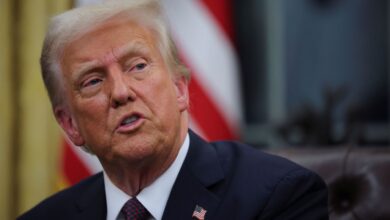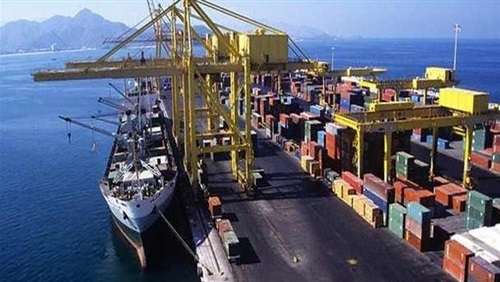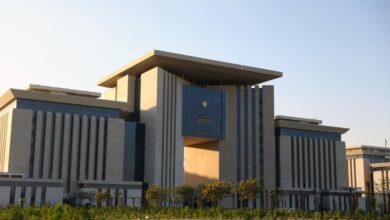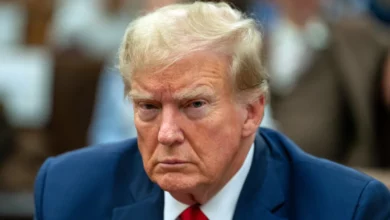Washington DC–Mohamed ElBaradei, Egyptian crusader for political change and emergent de facto leader of the opposition, concluded a series of public appearances in Boston today amid widespread controversy and media scrutiny.
ElBaradei met with 70 Egyptian-American academics, partook in a public discussion at Harvard University, and appeared on CNN with political adversary, National Democratic Party member Ahmed Ezz earlier this week before completing his tour with a luncheon lecture at Tufts University.
Speculation surrounds the visit from the Nobel Peace Prize Laureate. Some analysts claim he embarked on this tour with hopes of cultivating global appeal. Others, however, disagree.
“ElBaradei’s focus is and it should be inside Egypt and not any foreign outreach or platform,” says David Pollock, senior fellow at the Washington Institute of Near East Policy. “From his standpoint, there is no pressing reason to come to Washington or to spend a lot of time outside of Egypt. He’s already done that.” Pollock argues that ElBaradei has already garnered sufficient global credibility in his three decades abroad. This trip, according to Pollock, does not appear to be strategic.
“He already has a lot of visibility. I don’t see how this particular trip makes a significant difference,” says Pollock. “If his intention were to drum up more support or more visibility in the United States, this would be, I suppose, a longer trip with more stops.”
ElBaradei, who has recently emerged in the Egyptian political landscape as a beacon of hope for those pressing for greater transparency in the democratic process, agreed to attend the Harvard event months ago, according to members of his National Association of Change (NAC) movement. He came to the public forum to deliver the unique insight of history’s only three-term Director General of the International Atomic Energy Agency (IAEA) and to discuss what continues to be a grave concern for many in the global community: international nuclear security.
On Tuesday night, for nearly forty minutes of an hour and twenty-minute conversation and round of questions with long time acquaintance Graham Allison of Harvard University, ElBaradei managed to stave off talk of Egyptian politics. Among other issues, he discussed the agency’s involvement in the lead up to the US-led invasion of Iraq in 2003. During that period, ElBaradei maintained Iraq posed no nuclear threat, much to the dismay of the Bush Administration who aggressively vilified the man. He spoke to the Iranian debate and emphasized the threat of nuclear acquisition by extremist organizations.
However, the silence on his political aspirations lasted only so long.
“We’re here mainly talking about international security,” Harvard Professor Allison said. “But many people also have another question in mind so … What about Egypt?”
ElBaradei then launched into a praising of Egyptian stature and a denunciation of both the Mubarak regime and political suppression throughout the Arab World. “Egypt is a precursor, in my view, for modernity and moderation in the Arab World so I have been saying, for the last few months, we need to make a move from an authoritarian system that has been going on for 58 years to a democracy,” ElBaradei said to a packed audience. “Empowering people is the only way to move forward.”
ElBaradei said he sensed the looming danger of increased extremism in Egypt, a product of the disenfranchisement of the population. Systematic change in the political landscape, according to ElBaradei, is the most effective means to prevent radicalism.
“As I always say, people are the result of their own environment. I would love to see more Mother Teresas and less suicide bombers. You will not get that unless you create the environment where people are created with dignity and pride and they feel empowered,” he said. “That’s not happening in the Arab world. That’s not happening in Egypt.”
Assistant Professor of Arab Politics at the Center for Arab Studies at Georgetown University Samer Shehata argues the Egyptian perception of this trip depends largely, not surprisingly, on how the local media portrays it. “If papers, more likely papers that are aligned with the government, spin this trip in a way, I think incorrectly, that he’s here to get the support of the U.S. government or the support of the Egyptian Diaspora,” Shehata said. “Then that would obviously be quite negative for his standing in Egypt.”
Shehata speculates ElBaradei will benefit, however, from truthful media attention regarding this visit. “If they report accurately that ElBaradei was here on the invitation of Harvard University to give a lecture and, at the same time, he was invited by Egyptian Americans, after he received the invitation, to meet with that community,” said Shehata. “I think that’s a good thing.”
Although ElBaradei came to the United States to discuss the issue of international nuclear security, his meeting with Egyptian academics was essentially mandatory. Since emerging on the political stage earlier this year, ElBaradei has promoted the necessity of bringing Egyptians abroad into the political scenario. He has championed the cause of allowing Egyptian expatriates to vote in elections. This was an indispensable opportunity to show the community that the change he desires involves their participation.
Shehata says Egypt has become an inhospitable environment for investment from its citizens living abroad and, because of that, Egypt drastically suffers. Should political and economic policies change, Egypt and Egyptians would reap the benefits.
“You can imagine a situation which if the situation changed in Egypt you would have huge human resources of people who live overseas who are highly educated, who have capital, who would come back to Egypt, invest their money there and help the country,” said Shehata. “So I think that’s a very good thing (that he met with the Egyptian academics) and there’s nothing wrong with it.”




